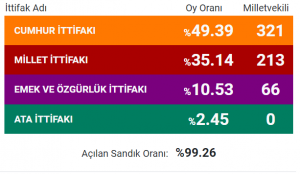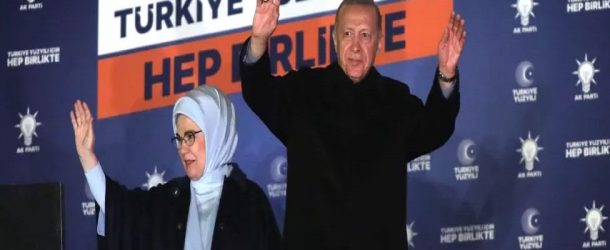Introduction
Turkish people went to ballot boxes yesterday during a sunny Sunday on May 14, 2023 to determine the future of the country in a democratic way. Elections took place in a calm and safe environment and no violence-based events took place throughout the country. Although finalized election results are not officially announced, it seems like there will be a second round for the presidential election between the current Turkish President and AK Parti leader Recep Tayyip Erdoğan and the opposition’s candidate and CHP leader Kemal Kılıçdaroğlu two weeks later on May 28, 2023. On the other hand, Erdoğan’s bloc (People’s Alliance-Cumhur İttifakı) achieved to secure a large parliamentary majority against the opposition’s Nation Alliance (Millet İttifakı) bloc. These results could be defined as Erdoğan’s another victory since he has very high chance to win the presidential election in addition to a clear parliamentary majority.
Presidential Election: Erdoğan almost won in the first round!
2023 Presidential election in Türkiye is often pointed out as the most important election in 2023 by the international media since two competing leaders have offered very different perspectives for the future of Türkiye during the 100th year anniversary of the Republic. Incumbent President Erdoğan offered a status quo based on hyperpresidentialism, a more Islamic and nationalist vision for Türkiye to become a regional power based on its developing defense industries, and better relations with the Russian Federation. The opposition leader Kemal Kılıçdaroğlu on the other hand promised a return to classical Westminster parliamentary system, better relations with Western countries (the United States and the European Union), dialogue and negotiation methods for all political and diplomatic problems, and a more secular vision for the new generations.

Unofficial results of the first round of presidential election
Source: NTV
Unofficial results show that, after 20 years in power, Turkish President Recep Tayyip Erdoğan is still very powerful and popular in the country as he slightly lost his chance to win the election in the first round with approximately 49.4 % of the total votes (around 27 million votes). On the other hand, the opposition leader Kemal Kılıçdaroğlu, who was declared to be the favorite candidate by almost all public opinion poll companies, had a record vote (for the opposition) around 45 % (approximately 24.5 million). Ultranationalist candidate Sinan Oğan had got 5.2 % percent (around 2.9 million), whereas the pro-secular Kemalist candidate Muharrem İnce, who was withdrawn from the race a few days before the election upon social pressures, reached 0.4 % (240.000 votes) since his name was written in the ballot.
Results show that Erdoğan is ahead of Kılıçdaroğlu with a 2.5 million votes difference, which seems very unlikely to be narrowed down in the second round. Ultranationalist candidate Sinan Oğan has around 3 million supporters, but Kılıçdaroğlu has to take almost all votes of Oğan to win over Erdoğan in the second round. For me this option is out of the question since most of Oğan’s Turkish nationalist and far-right voters will vote for Erdoğan due to pro-Kurdish HDP’s support to Kılıçdaroğlu. Moreover, I think the parliamentary election results will provide an extra motivation for the pro-government voters. That is why, I guess Erdoğan will win the election in the second round easily with 54-58 % of the total votes.
Erdoğan’s victory will be a huge defeat for the opposition as the opposition supporters were very motivated and convinced for victory this time. The election will probably lead to a leader change in CHP, making Istanbul mayor Ekrem İmamoğlu the new leader of the pro-secular party. Erdoğan on the other hand will shape the future of the country without any barriers for another 5 years term and will strive to make Türkiye a more Islamic, nationalist, and militaristic regional power. However, Erdoğan might have to work with new names in his cabinet since he decided to put all his deputies into parliamentary positions before the elections. A refreshed cabinet with fresh names and new faces could create a space for Erdoğan to establish better relations with the West, but the general trend gives me the idea that Türkiye might have even more problematic relations with Washington and Brussels in the near future and it would have to develop closer ties with Putin’s Russia and China instead.
Parliamentary elections: People’s Alliance domination
Parliamentary elections were a big victory for the government as the pro-Erdoğan bloc secured around 322 seats (267 for AK Parti, 50 for MHP, and 5 for New Welfare Party-YRP), a clear majority in the parliament. Similar to Erdoğan’s votes in the presidential election, pro-government bloc had got around 49.4 %. The opposition on the other hand stayed around 35 %, which led to 169 seats for CHP (around 37 of these seats will go right-wing parties within the bloc) and 44 for Good Party-İYİ Parti. With a vote around 10-11 %, pro-Kurdish and leftist bloc (Labour and Freedom Alliance-Emek ve Özgürlük İttifakı) also secured 65 seats in the Turkish Grand National Assembly (TBMM); 61 for HDP and 4 for Turkish Labour Party (TİP).

Unofficial results of the parliamentary election
Source: NTV
Results show that a return to parliamentary system is impossible unless the pro-government bloc is convinced and Türkiye will continue to be ruled by a hyperpresidential system, which is often criticized for being a new form of “Sultanism” by many pro-Western political scientists in Türkiye. Furthermore, relatively low success of the opposition might lead to internal problems within the Nation Alliance (Millet İttifakı), especially between the nationalist İYİ Parti and the social democratic CHP. Before the election, İYİ Parti leader Meral Akşener insisted on the candidacy of İstanbul mayor İmamoğlu or Ankara mayor Mansur Yavaş, but she was not able to convince Kılıçdaroğlu and other four right-wing parties within the bloc. So, after the second round, polemics might increase between CHP and İYİ Parti circles.
Winners
It seems like the biggest winner of the election is again President Erdoğan. As far as I’m concerned, he will be easily elected once again two weeks later, plus he will a have a strong majority in the parliament. Erdoğan is a tactical genius for political polarization based on the lifestyle and culture and he appeals to average Turkish voters better than other leaders.
Sinan Oğan, with his unexpected 5 % in the first round of presidential election, is another winner. Erdoğan and Kılıçdaroğlu could both offer Oğan an important position in their possible cabinets. However, I think Oğan will stay closer to Erdoğan and might even decide to work with him due to his close ties with the Azerbaijan and ultranationalist rhetoric against HDP. It will not be surprising for me if Oğan becomes for instance the new Foreign Minister of Türkiye in the cabinet of Erdoğan. Moreover, with his increasing popularity, Oğan could play for MHP’s leadership in the near future after Bahçeli.
Turkish nationalist MHP and its veteran chair Devlet Bahçeli also could be stated as victorious after these results. Although all polls were showing MHP around 6-7 % before the elections, the party had got more than 10 %, better than their pro-secular equivalent İYİ Parti’s 9.8 %. Moreover, MHP was able to pave the way for Erdoğan’s victory in the presidential election.
Islamist YRP (New Welfare Party) is another winner, taking almost 3 % of the votes in their first election and proving that anti-Occidentalist Islamism will continue to develop in Türkiye.
Conclusion
Election results show that despite of the huge economic problems and epic failures of management made by the government after the earthquake disaster in February this year, Turkish people continue to vote on the basis of their religious, sectarian, and ethnic identity in elections and populist right-wing politicians like Erdoğan use these identities skillfully. In fact, I call elections in Türkiye as “census“, since almost all people vote for their identities and lifestyles, not for the projects and visions of the candidates and parties.
Elections might lead to Türkiye’s deteriorating relations with the West and a more troubled economic situation. In that sense, Erdoğan’s last term might be even shorter than 5 years in case economic problems would grow seriously. In addition, elections will probably cause a leader change in pro-secular CHP since Kemal Kılıçdaroğlu is now old and he used his last chance to become the President. Although he has a center-right background, İstanbul mayor Ekrem İmamoğlu is the favorite candidate to replace him.
Lastly, in my opinion, with Erdoğan in office, Türkiye will now do its best to get Donald Trump elected in the U.S. to change Washington’s approach to many issues including the Kurdish Question, democratization, the Eastern Mediterranean, and relations with Russia.
Cover Photo: BBC
Assoc. Prof. Ozan ÖRMECİ

























































